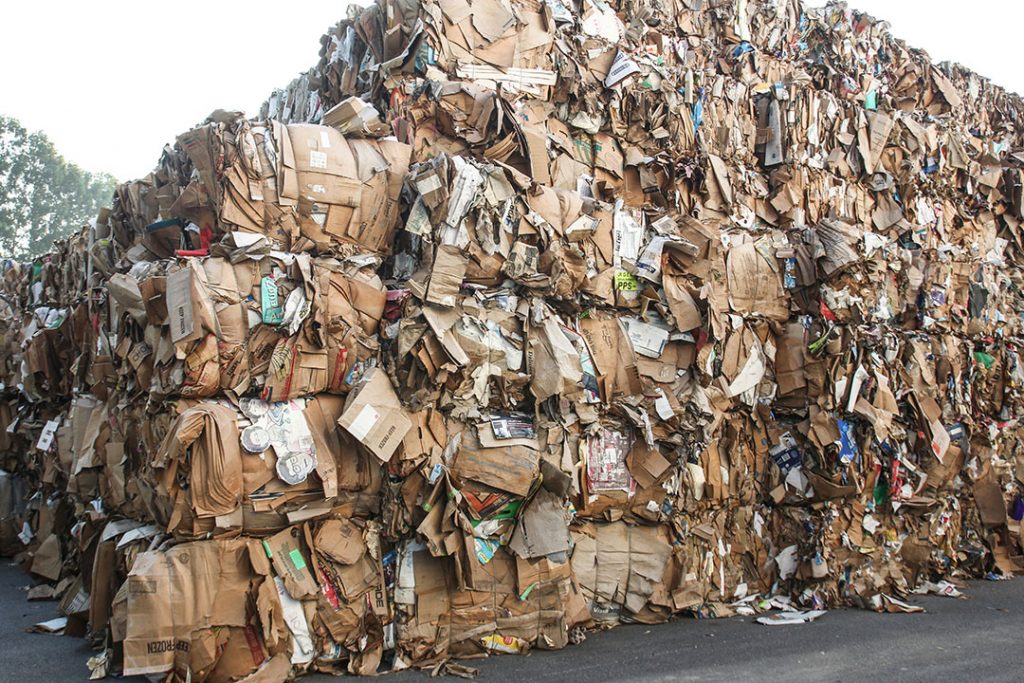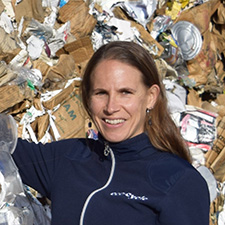
Paper recycling has moved to the center of the EPR debate in Colorado. | olephoto/Shutterstock
Municipal recycling advocates and the fiber manufacturing industry are at odds over a producer responsibility proposal in Colorado, underscoring a major rift in the push for stronger recycling policy.
In an April 27 press conference on Colorado’s proposed bill for extended producer responsibility for packaging, Terry Webber, vice president of industry affairs for the American Forest & Paper Association (AF&PA), said the paper industry already has a high recycling rate and he would “really like our policymakers to avoid measures that might penalize or disrupt this success.”
AF&PA has also opposed New York’s EPR bill for the same reasons, saying in a press release that “Albany’s EPR scheme is a regressive solution in search of a problem” and calling on lawmakers to “toss this bill into the recycle bin.”
But representatives from the state recycling organization in Colorado are pushing back, arguing that paper recycling in the state is lagging and can be bolstered by the type of system funding overhaul that EPR can provide. (EPR mandates that product and packaging stakeholders fund and/or manage end-of-life concerns for the items they put on the market in a given jurisdiction.)
This week, nonprofit organization Recycle Colorado released a white paper noting that the paper recycling rate in Colorado is far below national averages.
A press release from Boulder, Colo.-based recycling facility operator Eco-Cycle added that paper makes up 19% of waste in Colorado landfills each year and the proposed EPR bill will “greatly improve paper recycling rates and those of other materials by providing convenient recycling to all Colorado residents at no charge.”
In the coming days, it will be up to Colorado legislators to decide whether to push forward an EPR bill that requires product manufacturers, including those in the paper sector, to help fund recycling.
The bill, HB22-1355, moved out of committee on April 26 and was slated for a House vote on April 28.
Learn more in person
A variety of recycling policy insiders will take to the stage for an EPR Town Hall discussion at the 2022 Resource Recycling Conference, Aug. 15-17 in Austin, Texas. Join us for exclusive insight on how the policy trend could continue to reshape U.S. municipal recycling in the years to come. See full details on the session lineup and sign up at the early-bird rate today.
Larger national policy trend
The Colorado EPR bill would mandate that companies that sell consumer-facing packaging and some printed paper in or into the state to join a producer responsibility organization (PRO), with exceptions for smaller business and highly regulated packaging, such as medicines. The PRO would then, through dues, fund and manage a statewide recycling system.
The program would start in 2026.
Last year, Maine and Oregon ushered in EPR for printed paper and packaging, though their approaches differ widely and much will be determined through rulemaking in the coming months and years. EPR was introduced in a number of other states this year, though nothing has passed thus far.

Terry Webber
All that activity has recycling stakeholders actively engaged in policy conversations in a major way, and the paper industry has grown more vocal about its EPR concerns.
At the Colorado-focused press conference, AF&PA’s Webber said the paper industry has already committed to spending $5 billion by 2024 on manufacturing infrastructure investments, and that any PRO fees would reduce the amount the industry could spend on those investments.
Much of the paper manufacturing sector’s recent investment activity has focused on building or converting mills to consume more recycled content, a key trend in domestic recycling market development.
Webber also said that the paper industry has met or exceeded a 63% recycling rate for the past decade nationwide.
The Recycle Colorado white paper, however, said that in Colorado, the paper recycling rate is 27%. If OCC is not included in that tabulation, the paper recycling rate in the Centennial State is only 11%, Recycle Colorado calculations indicate. The group said 1.1 million tons of OCC and paper was landfilled in 2020 in the state.
Kate Bailey, Eco-Cycle policy director, told Resource Recycling that the paper industry’s investments and the EPR bill are complementary efforts.
“The paper industry has invested a lot into adding more domestic recycling capacity, especially in the wake of China’s National Sword, and they deserve credit for those investments,” she said. “But those investments have largely been in paper mills and remanufacturing facilities” not collection systems and recycling.
“Producer responsibility is funding the entire system,” she added.
Webber of AF&PA said during the press conference that in Colorado, 61.1% of people have drop-off recycling access, and 49.8% have access to residential curbside paper recycling.
He said he’s concerned the EPR bill could disrupt the paper industry’s success, and that the industry doesn’t want to subsidize other materials that have been less successful at recycling.
“We shouldn’t be required to fund others,” he said.
‘Solution is required now’
Michael Washburn, senior policy director at The Recycling Partnership, told Resource Recycling that the paper industry does have high recycling rates, but there’s also a large amount of lost products, and the potential is there to reclaim much more. (The Recycling Partnership is a group backed by brands and other corporate recycling stakeholders, and it is focused on improving municipal recycling in the U.S.)
Washburn noted The Recycling Partnership’s data shows that three of every five cardboard boxes in U.S. households go into the trash, as does two-thirds of mixed paper. That’s at least 4 million tons of OCC per year and 11 million tons per year of mixed paper sent to disposal.
Those numbers are only growing with e-commerce, he added.
“What, then, does the industry want to do to capture those lost tons?” he said, adding that currently “that fiber is destined to become methane” and with the pressure of climate change, “a solution is required now.”
However, opponents of the Colorado EPR bill are also pointing to areas of concern beyond the matter of recycling efficacy in the current system.

Kate Bailey
As part of AF&PA’s press conference, Rachel Beck, executive director of the Colorado Competitive Council, laid out several legal problems she sees with the bill.
“Our issues are not with the goal of recycling and increasing access to and participation in recycling,” she said, adding that everyone she had spoken with supported increasing recycling rates.
Rather, she said she had concerns about making a nonprofit PRO in charge of such an endeavor. She said she thinks the bill could restrict freedom of association of those identified as producers and could run afoul of the state’s nondelegation doctrine that says the legislature is responsible for a certain functions and are prohibited from delegating those, especially to a nongovernmental organization.
Beck also said Colorado’s recently passed Proposition 117 requires voter approval of any new government-owned business that will charge a fee of more than $5 million annually, and depending on how the fee structure of the EPR bill is laid out, the state recycling system could be covered by that requirement.
Bailey said she and the bill’s supporters have been working closely with the state attorney general this week on amendments to make sure the bill is fully in line with Colorado law.
“We’ve had a lot of conversations and worked through quite a few amendments with the state attorney general’s office,” she said. “We’re in a much stronger position, because those are great concerns.”
Bailey also noted local government leaders from the Colorado Municipal League and Colorado Communities for Climate Action are “in strong support of producer responsibility” and over 20 local governments testified in support of HB22-1355 during the first committee hearing.
Many local government leaders also signed a letter in support of the bill, as did several large brands and packaging producers, including Amcor, Coca-Cola, L’Oréal USA, Mars, Nestlé, PepsiCo, SC Johnson and Unilever United States.
More stories about EPR/stewardship
- CAA publishes revised Colorado program plan
- WM outlines investments in recycling infrastructure
- ‘Operational readiness is high’ as Oregon rolls out EPR



